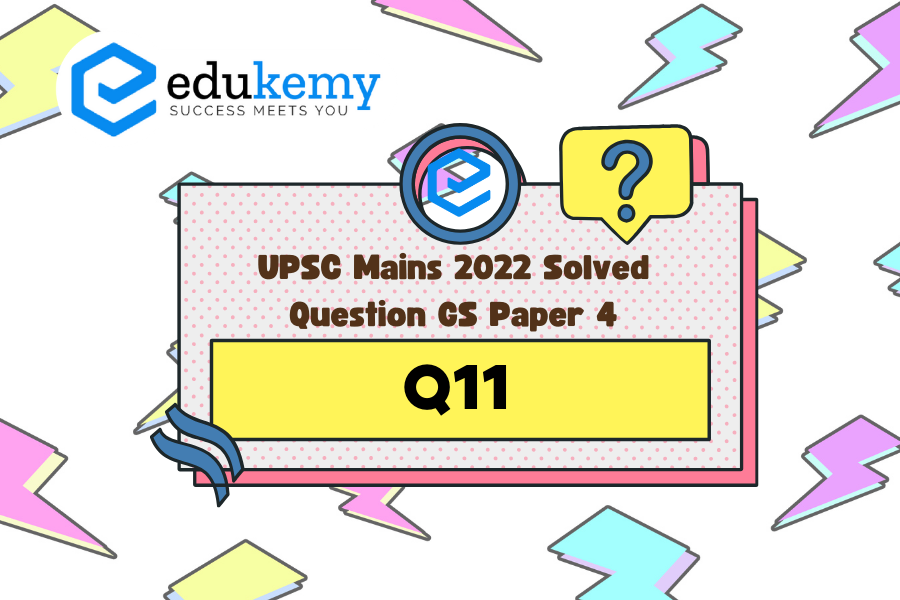The Union Public Service Commission (UPSC) General Studies Paper 4, often referred to as GS 4, is a significant component of the Civil Services Examination in India. This paper focuses on ethics, integrity, and aptitude, aiming to assess candidates’ ethical and moral reasoning, decision-making abilities, and their understanding of governance-related issues. The 2022 GS 4 Solved Question Paper serves as a crucial resource for aspirants, providing insights into the exam’s structure, the type of questions asked, and exemplary answers. Through a comprehensive analysis of this paper, candidates can refine their preparation strategies, enhance their ethical understanding, and cultivate the aptitude necessary for serving the nation with integrity and excellence in administrative roles.
Contents
Q: Write short notes on the following in 30 words each :
- Constitutional morality
- Conflict of interest
- Probity in public life
- Challenges of digitalization
- Devotion to duty
(i) Constitutional morality
Ans. Constitutional morality refers to the adherence to core principles of constitutional values such as democracy, equality, and integrity. It involves a commitment to an inclusive and democratic political process. It encompasses more than just adherence to constitutional principles. It also involves fostering a pluralistic and inclusive society, which benefits each individual citizen through the state apparatus.
India’s decriminalization of homosexuality in Navtej Singh Johar v. Union of India exemplifies constitutional morality by upholding core constitutional values of equality, dignity, and freedom of expression.
(ii) Conflict of interest
Ans. Conflict of interest occurs when personal, financial, or other interests influence professional judgment, compromising integrity, objectivity, or credibility. It is generally considered unethical and can have legal consequences. For example, Former Chief Justice of India Ranjan Gogoi’s nomination to the Rajya Sabha by the ruling political party raised concerns of conflict of interest due to his past rulings on cases involving the party and its leaders.
A person working in a private firm may have to make decisions that conflict with their personal values. For instance, in an organisation a wife is being favored by her husband not because of her capabilities but because of the relationship that they share.
(iii) Probity in public life
Ans. Probity in public life refers to the ethical standards that society expects from elected or appointed public officials in their conduct of public affairs. These standards are crucial in preventing corruption and abuse of power by those who have access to public resources and decision-making authority. For instance, public officials are expected to avoid conflicts of interest, act in the public interest, uphold the rule of law, and be accountable to the citizens they serve.
Satyendra Dubey was an engineer working on the Golden Quadrilateral project in India. He reported irregularities and corruption in the project to the authorities, but his concerns were ignored. He then wrote a letter to the Prime Minister’s Office, but his identity was leaked and he was subsequently murdered. Dubey’s actions are an example of probity and the risks that can be involved in speaking out against corruption.
(iv) Challenges of digitalization
Ans. The challenges of digitalization include:
- Privacy and data protection: the Aadhaar data leak
- Challenges to cybersecurity: cyber attacks on financial institutions
- Bias and discrimination
- The digital divide, and responsibility and accountability.
(v) Devotion to duty
Ans. Devotion of duty refers to a public servant’s commitment to fulfilling their responsibilities and obligations to the best of their abilities, with integrity and without fear or favour. For example, Forest officer Sanjiv Chaturvedi showed devotion to duty by exposing corruption in Haryana forest land allocation, despite threats.
If a public servant lacks devotion of duty, they may neglect their responsibilities, act in their own self-interest or in the interests of a few individuals or groups, and compromise the principles of ethical conduct. This can lead to corruption, inefficiency, and unfairness in decision-making, resulting in negative consequences for the public. Such actions can also undermine public trust in the government and public institutions. Therefore, it is important for public servants to uphold the principle of devotion of duty in carrying out their responsibilities.
In case you still have your doubts, contact us on 9811333901.
For UPSC Prelims Resources, Click here
For Daily Updates and Study Material:
Join our Telegram Channel – Edukemy for IAS
- 1. Learn through Videos – here
- 2. Be Exam Ready by Practicing Daily MCQs – here
- 3. Daily Newsletter – Get all your Current Affairs Covered – here
- 4. Mains Answer Writing Practice – here


